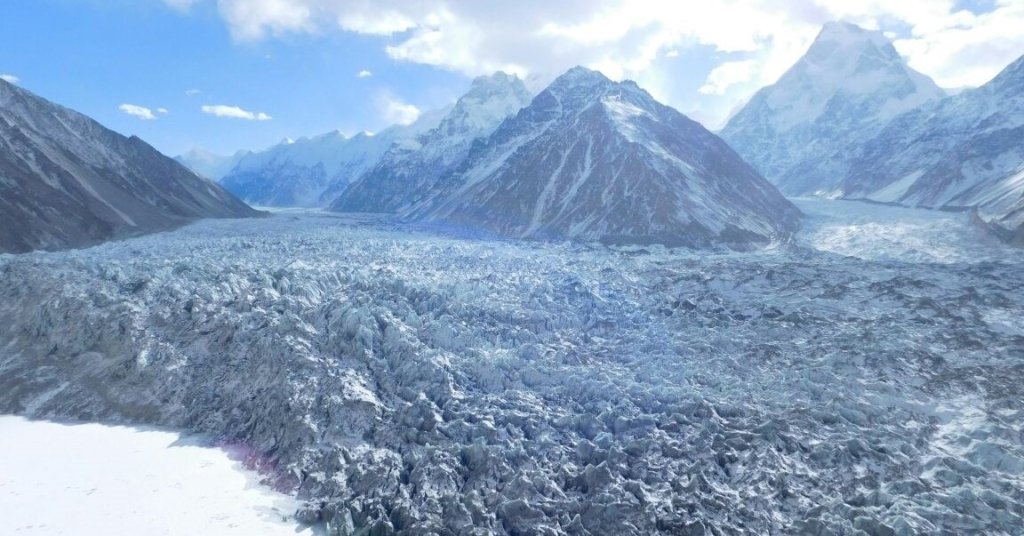The UN’s IPCC report, warning of melting glaciers in Gilgit-Baltistan should be a wake-up call for Pakistan..
Scientists are observing unprecedented changes in climate systems across the globe. Many of the changes are unprecedented in thousands, if not hundreds of thousands of years, and some of the changes already set in motion — such as continued sea-level rise — are irreversible over hundreds to thousands of years, says a UN report.
However, the report published by the UN’s Intergovernmental Panel on Climate Change (IPCC) in August suggests strong and sustained reductions in emissions of carbon dioxide (CO2) and other greenhouse gases would limit climate change.
The report warns that the consequences of the current global warming crisis such as glacier melting, floods, and sea-level rise are largely irreversible. The most we can do is to prevent all-out ecological collapse, writes Erum Haider, an assistant professor of Political Science and Environmental Studies at the College of Wooster, OH, in Al-Jazeera web pages.
One of the more sobering findings of the report is that polar and mountain glaciers are likely going to continue to melt, irreversibly, for decades or centuries to come, she writes.
Pakistan has more glaciers outside the polar icecaps than anywhere on earth. The glaciers feed one of the oldest and most fertile valleys on the planet – that of the Indus Basin, split between India and Pakistan.
Roughly 75 percent of Pakistan’s 216 million population is settled on the banks of the Indus River. Its five largest urban centres are entirely dependent on the river for industrial and domestic water.
Pakistan has been blessed with regular agricultural cycles that have sustained its economy through successive crises. However, if the IPCC Report is correct – which it almost certainly is – by 2050, the country will be out of water, she writes.
Pakistan is not the only low-income country facing the impacts of climate change. It is not alone in looking on helplessly as industrialized nations – China and the US being the foremost – drag their heels on lowering emissions.
Like the Maldives and many other island nations, Pakistan will suffer from the consequences of global warming disproportionately. However, unlike many countries that have taken up the issue of global emissions at the UN, Pakistan is not doing even the bare minimum to try and secure its future, Ms Haider argues.
To say that this is the largest security issue the country will face in the next few decades would be putting it mildly. No other country is as dependent on non-polar ice for freshwater as Pakistan. No other country stands to lose as much.
Yet, Pakistan’s government seems singularly unaware of the looming crisis. It has not even made much effort to meet its target of producing 60 per cent of its electrical power from renewable sources by 2030. At the moment, the country still gets well over 60 per cent of its electricity from fossil fuels.
Pakistan is already facing mounting environmental challenges. Heatwaves are killing scores of people and impacting crop cycles and yields on a regular basis. This year, both its largest city Karachi and its capital city Islamabad experienced devastating floods.
Furthermore, the 806-kilometre (500-mile) Karakoram Highway, which is a critical part of Pakistan’s economic corridor with China, was shut down multiple times, for multiple days due to landslides. These devastating landslides were a direct result of large-scale deforestation in the area north of Kohistan and south of Jaglot. Further north towards Shimshal and east towards the Skardu Valley, timber mafias are rapidly stripping old-growth forests, all but guaranteeing future environmental catastrophes.
Local and international environmental experts have long been warning that, without urgent and drastic action, things will get worse – both in Pakistan and wider South Asia. They have been warning for over a decade that Pakistan’s glaciers are melting and it is only a matter of time before the country runs out of water. Now the IPCC is saying the same in no uncertain terms.
Despite mounting evidence of a growing crisis, however, the Pakistani state is refusing to act, Ms Haider, the professor argues.
There are several local initiatives to understand and address the impact of climate change on the region, such as those of the Shimshal [Nature] Trust. But these efforts often face obstructions by the state and the military, who do not want environmental considerations and conservation projects to limit their control over strategic regions near the country’s borders with China and India.
Prime Minister Imran Khan announced, at the beginning of his term in 2018, the Million Tree Plantation Drive to counter the effects of ongoing deforestation and climate change on the country.
This, however, is akin to adding a fourth wheel to a tricycle and hoping it will eventually transform into a driverless electric car. No amount of new tree planting can replace old-growth forests. This is just a fact. The ancient alpine and conifer forests quite literally hold the ecology of northern Pakistan – its glaciers, rivers, and fertile valleys – together. They have taken millennia to grow and stabilise. They are irreplaceable, she writes.
Today, Pakistan is facing an existential crisis. The effects of climate change are not threatening a single sector or region of the country, but the lives and livelihoods of its entire population. As this year’s IPCC report underlined, we are, sadly, already too late to reverse the damage caused by the rampant consumption of fossil fuels. The choice we are facing now – in Pakistan and around the world – is to continue on a path to certain destruction, or start fighting for our collective survival.

The High Asia Herald is a member of High Asia Media Group — a window to High Asia and Central Asia

